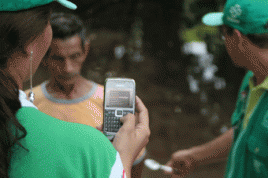Politik
Telefonica and Nokia partner to mobilize education in Latin America
Telefonica and Nokia have signed a strategic agreement to bring educational content to remote schools in Latin America through the use of mobile technology. The two industry giants made a commitment to transform the delivery of education in isolated areas as a way to close the digital inclusion gap in the region and promote social development.
24.04.2009

Foto: Nokia
The agreement will help expand the current scope of Telefonica Foundation's "Proniño" and "Educared" social programs - two of the most important private initiatives focused on using information and communications technologies in the improvement of the quality of education in the region- and complement Nokia's ongoing work to harness the power of mobile technology for social development.
During the annual Telefonica Leadership Conference, which is taking place this week in Miami, Telefonica COO Julio Linares, said: "This agreement fits our Spirit of Progress, which implies that we want to enhance people's lives as well as the progress of the communities where we operate, by delivering innovative services based on information and communications technologies. Wireless connectivity opens up strong opportunities of development and integration in Latin America".
Nokia's CEO, Olli-Pekka Kallasvuo, who was a guest speaker at the conference, said: "This partnership demonstrates the significant social benefits that mobile technology can deliver, reaching communities and children who previously had very limited educational opportunity in an inspiring and accessible way."
The first implementation of this agreement is planned for Chile, where Telefonica's mobile broadband and Nokia's advanced mobile software Nokia Education Delivery will enable isolated schools in Chile to have access to high quality educational content, including the most innovative resources, tools and services for students, fathers and teachers via Educared. The agreement will be later expanded to other countries in Latin America and will prioritize schools where Proniño works. Proniño and EducaRed will thereby be able to ameliorate educational quality through ICT application to learning processes in some of their rural schools without fixed broadband connectivity.
Proniño is a program that contributes to the elimination of child labor through quality education, reaching in 2008 more than 107,000 children across 13 countries in Latin America. EducaRed program works in the promotion of the use of ICT in education, through its innovative portal and different teachers, parents and children training programs. In 2008, EducaRed received more than 60 million visits from the educational community in its Spanish and Latin American websites (www.educared.net).
The agreement will also extend to the adoption of Nokia Data Gathering software by Telefonica Foundation within its Proniño program. Nokia's software solution will enable Telefonica Foundation to monitor and evaluate the impact of the implementation using mobile devices instead of paper forms. This will avoid duplication of data entry, enable faster decisions and reduce environmental impact.
Under the framework of this agreement, Nokia and Telefonica will also be working with local governments in Latin America in the use of information technologies to ensure and foster the competitiveness of their economies.
About Nokia
Nokia is committed to having a positive impact on society that extends beyond the advanced technology, products and services the company creates. Through its community involvement programs, the company prepares young people to embrace opportunities and possibilities created by the global economy and new technological advancements. The company has been an active regional contributor to youth and education causes for many years, with Nokia employees making their own contributions as volunteers in a range of programs throughout the world.
About Telefonica Foundation
Telefonica Foundation contributes to build the future of those regions where Telefónica operates, promoting social development through education and using main Telefónica strengths: its extensive customers database and employees, its extensive territorial presence and its technology capacities. It was created in 1998 and it is present in eight countries: Argentina, Brazil, Chile, Colombia, Spain, Mexico, Peru and Venezuela. The Foundation's actions also reach Ecuador, El Salvador, Guatemala, Nicaragua, Panama and Uruguay, thanks to Proniño program.Telefónica and its Foundation are convinced that education is the key to progress in any country and ICTs are an essential tool to improve learning processes and guarantee equal opportunities in the access to education.
About Telefonica Leadership Conference
For the seventh consecutive year, the Telefonica Leadership Conference continues a tradition of world-class speakers, thought-provoking panel discussions and opportunities to exchange ideas with over 700 Fortune 500 business leaders, industry experts and Telefonica executives. During the first day of the conference, a select group of CEOs, including Special Guest Speaker Olli-Pekka Kallasvuo, CEO of Nokia, have presented topics related to business strategy and innovations that drive growth. During the second day, senior executives of some of the leading IT/Communications corporations will share their vision on advancements in technology, and the shift towards "Mobilization" and "Cloud Computing."
During the annual Telefonica Leadership Conference, which is taking place this week in Miami, Telefonica COO Julio Linares, said: "This agreement fits our Spirit of Progress, which implies that we want to enhance people's lives as well as the progress of the communities where we operate, by delivering innovative services based on information and communications technologies. Wireless connectivity opens up strong opportunities of development and integration in Latin America".
Nokia's CEO, Olli-Pekka Kallasvuo, who was a guest speaker at the conference, said: "This partnership demonstrates the significant social benefits that mobile technology can deliver, reaching communities and children who previously had very limited educational opportunity in an inspiring and accessible way."
The first implementation of this agreement is planned for Chile, where Telefonica's mobile broadband and Nokia's advanced mobile software Nokia Education Delivery will enable isolated schools in Chile to have access to high quality educational content, including the most innovative resources, tools and services for students, fathers and teachers via Educared. The agreement will be later expanded to other countries in Latin America and will prioritize schools where Proniño works. Proniño and EducaRed will thereby be able to ameliorate educational quality through ICT application to learning processes in some of their rural schools without fixed broadband connectivity.
Proniño is a program that contributes to the elimination of child labor through quality education, reaching in 2008 more than 107,000 children across 13 countries in Latin America. EducaRed program works in the promotion of the use of ICT in education, through its innovative portal and different teachers, parents and children training programs. In 2008, EducaRed received more than 60 million visits from the educational community in its Spanish and Latin American websites (www.educared.net).
The agreement will also extend to the adoption of Nokia Data Gathering software by Telefonica Foundation within its Proniño program. Nokia's software solution will enable Telefonica Foundation to monitor and evaluate the impact of the implementation using mobile devices instead of paper forms. This will avoid duplication of data entry, enable faster decisions and reduce environmental impact.
Under the framework of this agreement, Nokia and Telefonica will also be working with local governments in Latin America in the use of information technologies to ensure and foster the competitiveness of their economies.
About Nokia
Nokia is committed to having a positive impact on society that extends beyond the advanced technology, products and services the company creates. Through its community involvement programs, the company prepares young people to embrace opportunities and possibilities created by the global economy and new technological advancements. The company has been an active regional contributor to youth and education causes for many years, with Nokia employees making their own contributions as volunteers in a range of programs throughout the world.
About Telefonica Foundation
Telefonica Foundation contributes to build the future of those regions where Telefónica operates, promoting social development through education and using main Telefónica strengths: its extensive customers database and employees, its extensive territorial presence and its technology capacities. It was created in 1998 and it is present in eight countries: Argentina, Brazil, Chile, Colombia, Spain, Mexico, Peru and Venezuela. The Foundation's actions also reach Ecuador, El Salvador, Guatemala, Nicaragua, Panama and Uruguay, thanks to Proniño program.Telefónica and its Foundation are convinced that education is the key to progress in any country and ICTs are an essential tool to improve learning processes and guarantee equal opportunities in the access to education.
About Telefonica Leadership Conference
For the seventh consecutive year, the Telefonica Leadership Conference continues a tradition of world-class speakers, thought-provoking panel discussions and opportunities to exchange ideas with over 700 Fortune 500 business leaders, industry experts and Telefonica executives. During the first day of the conference, a select group of CEOs, including Special Guest Speaker Olli-Pekka Kallasvuo, CEO of Nokia, have presented topics related to business strategy and innovations that drive growth. During the second day, senior executives of some of the leading IT/Communications corporations will share their vision on advancements in technology, and the shift towards "Mobilization" and "Cloud Computing."
Quelle: UD / cp


